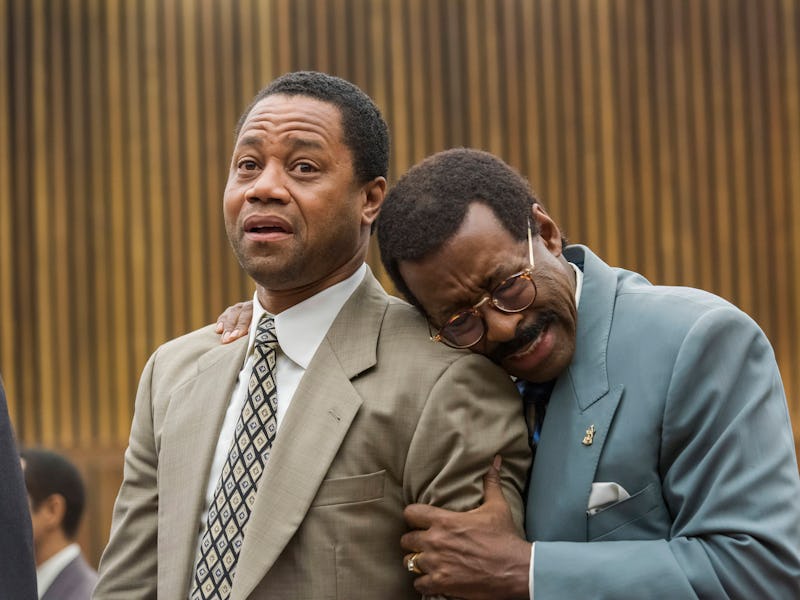The Finale of 'The People v. O.J. Simpson' Highlights Why It Was The TV Show of the Season
The Ryan Murphy-directed episode wrapped up the show tastefully, with some unexpected flourishes.

With the final episode of The People V. O.J. Simpson — the watercooler show we waited for every week, even if vast majority of the viewership already knew exactly how things would end — the show, to some extent, comes full-circle. Producer Ryan Murphy returns to direct the extended episode, and transports us back into the tense, heady mixture between public and private vantages of the trial — the very same world in his expert pilot.
In that episode, Murphy frequently put the audience behind the paparazzi cameras, breaching closed doors more often as the story continued. In the season finale, Murphy realizes a portion of the closing arguments by Clark (Sarah Paulson), Darden (Sterling Brown), and Cochran (Courtney Vance) as they were intended to be seen: through grainy video footage, from a harsh, impersonal overhead angle. Murphy simultaneously follows the lawyers’ careful choreography in the room: The camera clearly knows exactly where each of them are heading before they move. Cochran’s hyperactive, physically involved monologue is practically balletic, and Murphy shoots it as tightly as possible to enhance the intimacy and tension.
Shifting between two vantage points creates the contrast that showrunners Scott Alexander and Larry Karaszewski’s have toyed with across the ten-episode run: between stagey impersonalness, and moments of emotional transparency and warmth. The lawyers are putting on the show of their lives in the courtroom that day, but every move also seems linked directly to their own private emotions. Their performances feel volatile: like confessions, as much as each just playing his parts.
For as much as the series makes Cochran seem soul-less and ruthlessly manipulative, we sense that passion presages his notorious, almost cutesy final mantra: “If it doesn’t fit, you must acquit.” Later in the episode, he sheds a tear watching President Clinton denounce the racial unrest of the case, and the sincerity of Cochran’s mission is clear. “That’s the victory,” he murmurs. Because in the end — as in Marcia Clark’s case, as we learn in her final conversation with Darden — this case was as much about working through personal trauma for him, as the details themselves. “Avenge” and “vengeance” are words tossed around by both lawyers behind closed doors.
The People v. O.J. Simpson was also not about the case itself — certainly not the details that were largely irrelevant to the jury. Murphy’s finale finds Clark presenting all the very specific pieces of concrete evidence proving O.J.’s guilt — essentially, to the viewer for the first time on the show. Sure, we sat through minimal testimony in previous episodes and cursory explanations, including Clark’s very effective shot glass demonstration to Darden and his childhood friends. But this is the first time the sordid particulars have been laid out in full.
The cogent explanation feels like too little, too late; and no doubt, Murphy and company intend it to feel that way. We understand how little the information mattered when the jury entered their deliberation room. In this way, Murphy makes the jury’s perspective — and the mere “four hours” they devoted to Simpson’s fate — a bit easier to believe.
Awaiting the moment of truth
Given that the FX show focused relatively little on Simpson himself, it’s curious that the writers chose to end on his half-hearted charade of a coming-home party, and a final moment of self-reflection in front of that statue — of Simpson himself. But it was clear that the creators felt a final indictment was needed. Leaving things entirely open-ended — with real-world subject matter like this — could definitely be considered irresponsible. While The People v. O.J. Simpson successfully humanized most of its main characters, there was always an implication that, by leaving the viewer on the outside with O.J., the show implied guilt from the beginning. At the very least, Cuba Gooding Jr.’s portrayal demonstrated a clear deficit of empathy. With Simpsons frequent sighs of relief — and a bewildering pseudo-symbolic run-in with a supportive waiter — Alexander, Karaszewski, and Murphy pick their side in style in the season finale.
For as well-scripted as The People v. O.J. Simpson was, it was ultimately the power of the acting that made it probably the best show of this season. It’s ultimately Darden and Cochran’s closing scene together, which makes the final episode, and typifies the greatness of the show. It’s unclear what these two men learned about the world or themselves, just as it’s difficult to pinpoint how this season pushed our understanding of the Simpson case forward — or added anything new to the lexicon of ambitious television drama. Its most unusual achievement, perhaps, was managing to keep us riveted while watching a story that’s been far-too-public knowledge for over twenty years.
Cochran's last hurrah
What is certain, The People v. O.J. Simpson delivered an amazingly detailed dramatization of these iconic and still disturbing events. The show exploded the media view of the trial which still incorporating and commenting upon some of its narratives. It deepened our understanding of its personalities while still resonating with our pre-existing capsule understandings of them. Unlike every other show Ryan Murphy has been a part of, it was ultimately the show’s humility that made it great: the mere fact that it did not attempt to shift any paradigms, but simply tell to a powerful, culturally significant story with as much integrity and acumen as a heavily fictionalized — and inherently farcical — television show can.